Making the Circular Built Environment a Reality: A Call for Collaboration
Picking up from the 2023 PBL report released last January, we, the Circular Built Environment (CBE) Hub members of the Faculty of Architecture and the Built Environment, recognize the concerns raised and fully endorse the report’s findings. We firmly believe that the transition to a circular built environment calls for a systemic change. And we realize that now more than ever we all need to work together to achieve the 2030 and 2050 circular goals.
For that reason, we organised the first public debate on the evening of July 6 here at the Faculty of Architecture and the Built Environment. Based on your valuable input (and your positive feedback) from that day we have now identified a series of topics that we would like to discuss more in depth with you. This is why, starting this October, we will initiate a series of public debates. We will meet with you every other month and each one of the planned sessions will focus on a specific topic. We openly invite institutions, organisations and individuals alike. Our aim is to facilitate a more inclusive and open dialogue for envisioning shared circular futures and co-creating the values together with all of you. As an academic institution we acknowledge the responsibility we have with regards to the transition to a circular built environment and we express our willingness and readiness to assume an active role. So, join us and join our efforts for a creating a circular built environment together.
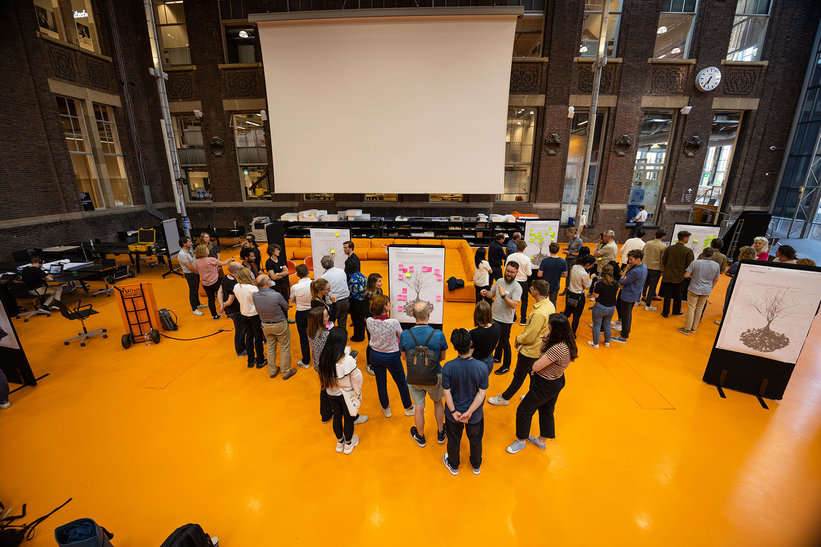
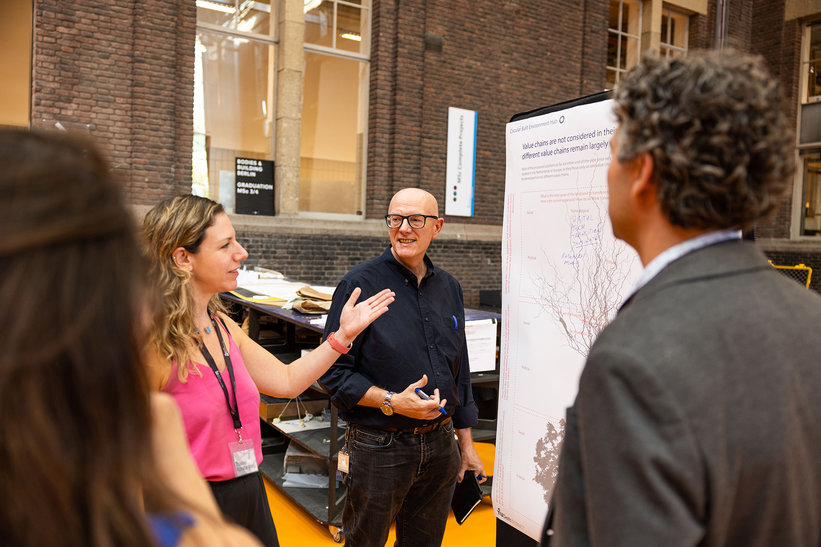
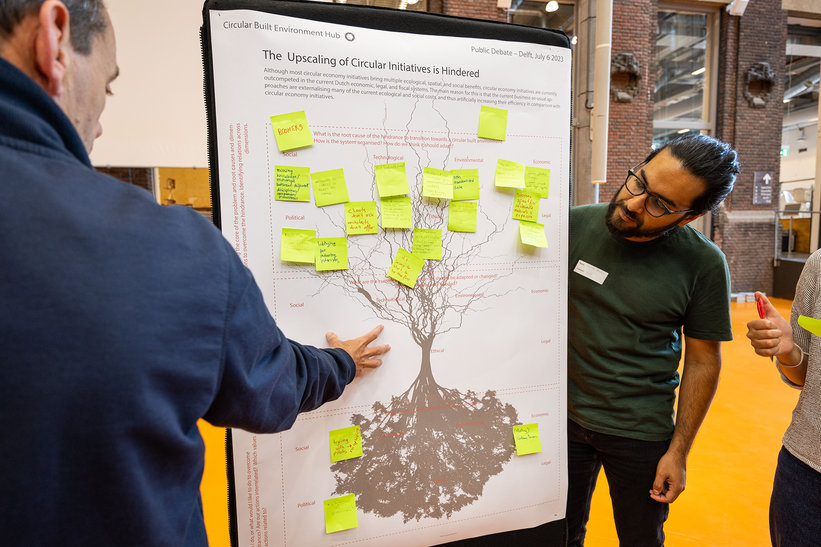
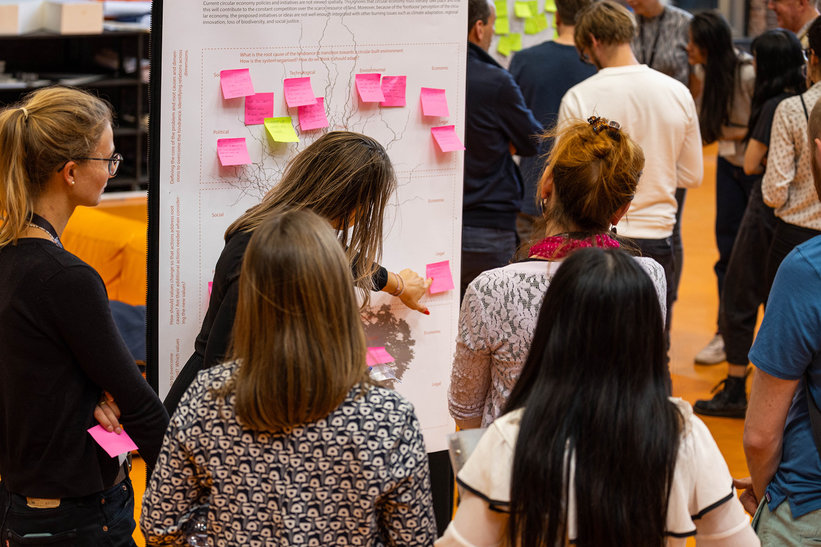
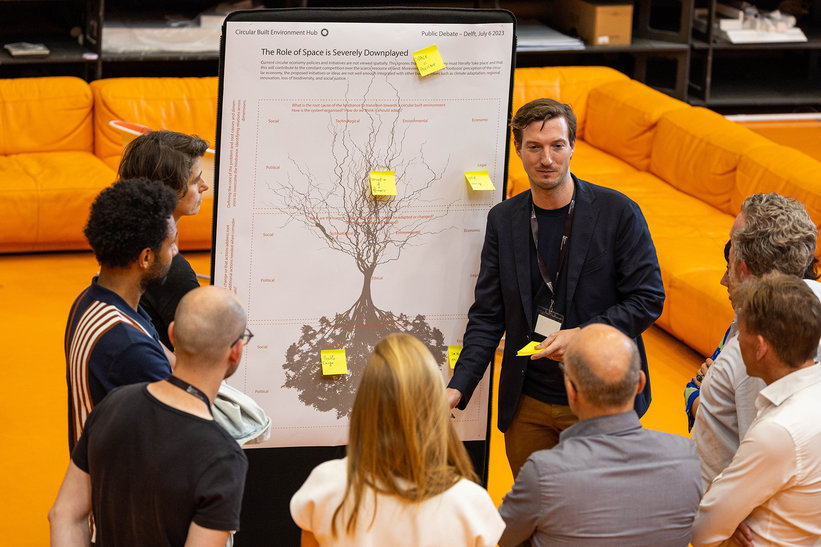
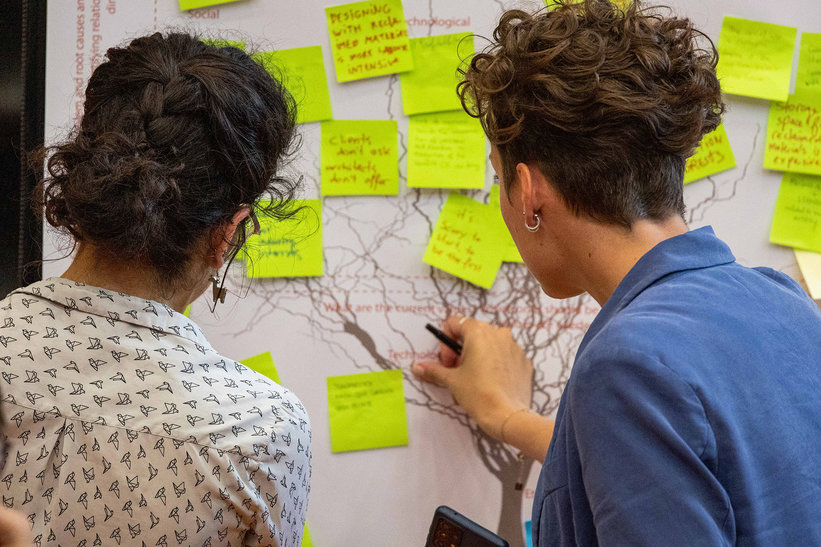
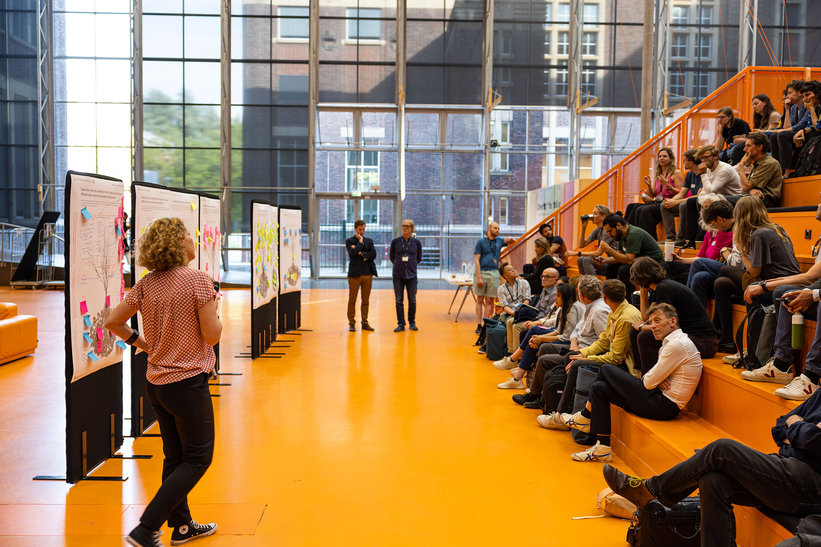
Photo impression public debate 'Making the Circular Built Environment a Reality' d.d. 6 July 2023 | photos by Marcel Bilow
The Faculty of Architecture and the Built Environment of TU Delft is committed to enabling the transition towards a circular built environment. Circularity is one of the six themes driving our current education programs. A rich portfolio of on-campus and lifelong learning offerings aims at educating the next generation of architects, urbanists, spatial planners and engineers in a way that circularity is embedded in their DNA. Counting more than 70 members, the faculty’s Circular Built Environment (CBE) Hub is at the forefront of research on circularity with projects running at a national, European and international level and with significant contributions to key aspects of the transition. However, we realise that we are still living in a waste-based society, and thus, we are still far away from upscaling the impact of circular innovations and applications in the real world.
This is why we would like to express our agreement with the findings of the recent Integrale circulaire economie report published by the Planbureau voor de Leefomgeving last January. The report argued that with the current trends and policies, the targeted reduction of 50% in 2030 of primary abiotic resources cannot be reached. We would also like to elaborate our concerns further and identify the three barriers that we think mainly hinder the transition:
- The role of space is severely downplayed. Current circular economy policies and initiatives are not viewed spatially. This ignores that circular economy must literally ‘take place’ and that this will contribute to the constant competition over the scarce resource of land. Moreover, because of the ‘footloose’ perception of the circular economy, the proposed initiatives or ideas are not well enough integrated with other burning issues such as climate adaptation, regional innovation, loss of biodiversity, and social justice.
- The implementation and upscaling of circular economy initiatives is lacking. Although most circular economy initiatives bring multiple ecological, spatial, and social benefits, circular economy initiatives are currently outcompeted in the current Dutch economic, legal, and fiscal systems. The main reason for this is that the current business-as-usual approaches are externalising many of the current ecological and social costs, and thus artificially increasing their efficiency in comparison with circular economy initiatives.
- Value chains are not considered in their totality and/or the creation of synergies between different value chains remains largely underexplored. Most of the proposed solutions so far are either end-of-the-pipe since only the last parts of production and foremost consumption chains are located in the Netherlands or Europe, or they focus only on one value chain and therefore are missing any synergistic opportunities that can be developed across different value chains.
Our course of action so far
Since its establishment in 2012, the CBE Hub has been actively organising and contributing with national and international partners, organisations and funding bodies to several research projects. Here is an overview of how we have been trying to address the aforementioned barriers so far.
1. Because of the manifold land claims, for mining and remanufacturing materials and components and growing bio-based materials, several CBE Hub research projects already seek to integrate principles of circularity and circular economy into urban and spatial planning. We see that land uses are crucial in multifunctional, cross-value-chain endeavours, like, for example, combining energy production with agricultural production and that a well-thought-through spatial planning will be necessary to avoid spatial conflicts such as (heavy) industry and living environments. Therefore, applying circular design principles on urban and landscape architectural scales is important. Furthermore, to avoid a ‘not in my backyard’ setback (same one we experienced at the beginning of the energy transition), we also need to engage in multiple forms of co-creation and co-production within a just sustainability transition.
In particular:
-
Pop Machina considers underutilized space in the city for circular makerspaces. The concept of circular makerspace links well with New European Bauhaus. Aspects such as training and skills, blockchain tokenization, new business creation and citizen engagement are tackled.
Further information -
The REPAiR project integrated resource management and spatial planning in living labs in 6 European cities.
Further information -
The Cities of Making projects developed a co-creation method that integrates the what (technology and resource), where (spatial condition) and how (governance and application) for urban manufacturing.
Further information -
The project ran from 2018-2021 by a consortium of TUDelft-ULeiden-EUR-WUR and VNO-NCW, Accez, and the Province of Zuid-Holland. Several perspectives were combined: material, social, governance, and value models. The outcomes of the project highlight the necessity of using a multi-scalar and multi-perspective framework. The report can be found here.
-
TU Delft aims to be carbon neutral, climate-adaptive and circular, with contribution to the quality of life and biodiversity, by 2030. The CBE hub helps this ambition by running a two-year research project aimed at mapping and matching the harvesting and built agenda of the campus, as well as to consider the governance and procurement procedures.
Further information
2. Furthermore, the CBE Hub research involves developing policies and incentives and changing behavioural patterns across the key domains of building and construction. Building on the lessons learned from earlier transitions like the energy transition, we acknowledge that acceleration and upscaling require that a. innovators are incentivised to develop their pilots further and to scale up their applications, b. new regulations are promptly installed to facilitate the process, and c. organizations change their processes and business models. However, at the moment, the upscaling and/or acceleration is not facilitated by any incentives or new regulations. This discrepancy is causing circular innovation to be considered an economically uncertain, high-risk endeavour. Still, this indirectly hinders the trial-and-error experimentation processes needed to demonstrate the potential of circular innovation that will ultimately outweigh the economic uncertainty of the moment.
In particular:
-
The NWO Kennis- en Innovatieconvenant (KIC) project SUBLIME (sustainable and reliable major steel infrastructures) runs from 2023-2027 and will examine how major steel infrastructures can be designed, refitted, and used circular and sustainable. The project combines technical, material, and governance perspectives.
Further information -
Within the AEGIR project standardisation and regulation process to improve sustainability and circularity in a refurbishing process are being analysed and connected to international, European and national standardisation processes. With this approach, circularity can be applied from pilot projects to a broader application.
Further information -
The International Round Table on material Criticality (IRTC Training), together with SusCritMat has a policy and materials development aspect in a circular setting.
-
This new project aims to develop the bi-lateral UK – NL partnership on CRM in a CBE.
-
Bridge the Gap is a research project to connect industrialized construction and the circular economy. With project partners Home.Earth, Technical University of Denmark and Delft University of Technology, the project studies how to facilitate faster adoption of new building technology in the European real estate sector. The goal is to promote the adoption of new building systems and industrialized supply chains that will help create a sustainable and circular economy.
Further information -
Het Nieuwe Normaal moet uiteindelijk een nieuwe, gedragen standaard met haalbare én ambitieuze circulaire prestaties in de gebouwde omgeving gaan worden.
Further information
3. A large body of research supported by the CBE Hub aims at decreasing the level of dependency to global material resources while also exploring synergistic opportunities between value-chains. We focus on bio-based building materials, and new forms of re-using and repurposing of buildings, components, and materials, as well as urban mining strategies and the related digital tools. Circular design strategies, like design for reassembly and reuse have to become standard and not the exception.
In particular:
-
Today in North-West Europe, only 1% of building elements are reused following their first application. Although a large number of elements are technically reusable, they end up being recycled by crushing or melting, or disposed. The result is a high environmental impact and a net loss of economic value. This project aims to increase by +50%, the amount of reclaimed building elements being circulated on its territory by 2032.
Further information -
In the AEGIR project value chains are optimized during the production, design and end of life phase. Through a close cooperation with the manufacturers, designers and building owner synergies between supply chains can be developed. Digital tools are also employed to facilitate the tracking and tracing of material streams.
Further information -
Lean Remanufacturing seeks to bring together Lean – resource efficiency with Remanufacturing – the production of products to as new condition.
-
This project seeks to develop a circular upscaling centre with a focus on materials, recycling, remanufacturing, circular manufacturing and just energy transition.
Further information -
The Netherlands – Germany cross border (NL Gov funded) project Euregional Sustainability Centre has a focus on circular spaces in cross border context.
Further information
-
Het Nieuwe Normaal moet uiteindelijk een nieuwe, gedragen standaard met haalbare én ambitieuze circulaire prestaties in de gebouwde omgeving gaan worden.
Further information
Looking towards the future
However, most of all, we realize that in order to reach the 2030 and 2050 goals, collaboration between all society partners must be strengthened. To overcome the obstacles identified here, research and education on the field of the circular built environment need to continue to focus on the systemic nature of this transition and the inevitability of the fact that institutions, organizations and individuals alike, all need to work together. This collaboration is crucial for envisioning circular futures, and co-creating the values we need to safeguard or further achieve. Much about the circular economy might be uncertain, but the need for technical, organizational, and social innovation is a well-accepted fact. The CBE Hub is ready to play an active role in this debate.
Public debate series
The Circular Built Environment Hub organises a public debate every two months. Each session focuses on a specific topic.
Institutions, organisations and individuals are invited to join.
Upcoming debate
Material culture - a broader vision on heritage
22 October 2024, 19:00 - 21:00
Faculty of Architecture and the Built Environment, TU Delft (Berlage room)
The Transition to a Circular Society in the Eurodelta
9 July 2024, 19:00 - 21:30
Faculty of Architecture and the Built Environment, TU Delft (Berlage room)
Past debates
People matter: exploring the social relevance of circularity
9 April 2024, 19:00 - 21:00
Faculty of Architecture and the Built Environment, TU Delft (Berlage room)
The often overlooked role of space in the circular economy transition
13 February 2024, 19:00-21:00
Faculty of Architecture and the Built Environment
Dissolving borders in the transition towards a circular built environment
12 December 2023, 19:00 - 21:00
University of Antwerp
Making the Circular Built Environment a Reality
6 July 2023, 18:00 - 20:00
Faculty of Architecture and the Built Environment, Oostserre